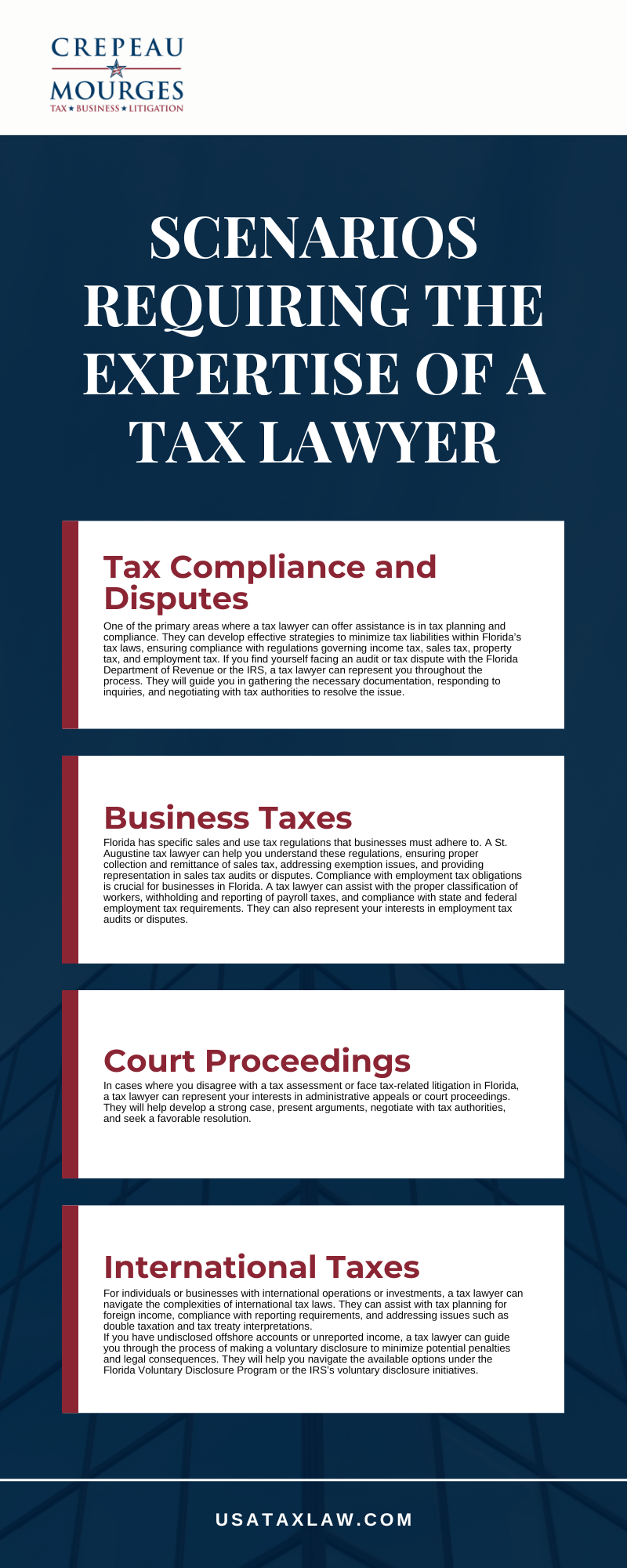
Legal Assistance With Your Tax Return
If you need assistance with your tax return, you may want to consult our St. Augustine, FL tax lawyer. Tax laws can be complicated and it’s possible to make mistakes. Here are some common mistakes to avoid on your tax return. Contact Crepeau Mourges today to schedule a consultation.
Selecting the Wrong Filing Status
On your tax returns, you can choose from five filing statuses: single, married filing jointly, married filing separately, head of household and qualifying widower. Choosing the correct filing status is one of the most basic and important aspects of doing your tax return. However, some people get it wrong. If you select the wrong filing status, it could affect how much in taxes you pay and your tax credits.
Entering the Incorrect Routing or Account Number
Many people choose to have their tax refunds directly deposited into their bank accounts. However, if you enter the wrong routing or account number, you will be waiting much longer for your refund. To avoid delays, double check your routing and account numbers before submitting your tax return.
Forgetting to Claim Deductions
When filing your taxes, it’s always wise to consider all the deductions you may be eligible for. After all, you don’t want to miss out on getting money you’re entitled to. For example, if you have a home office in your house, you may be able to claim a home office deduction.
Missing the Deadline
Sometimes people’s lives may get busy and they may forget to file their taxes on time. Unfortunately, as a St. Augustine tax lawyer can confirm, the IRS may issue a fine if you miss the deadline.
Forgetting to Sign Your Tax Return
This is another common mistake people make when filing their taxes. They may rush through the paperwork and forget something simple, such as signing their name on the bottom of the return. If you send in your return without your signature, the IRS will return it to you and require you to return it with a signature. That is why you should double check everything before submitting your return.
Misspellings
If the names of the taxpayer, spouse or children don’t match the tax identification number that the Social Security Administration has, your tax return could get returned.
Scenarios Requiring the Assistance of Our Tax Lawyer
Our St. Augustine, FL tax lawyer can provide valuable assistance with a range of tax-related issues. Tax laws can be intricate and subject to frequent changes, making professional guidance essential. Here are some ways in which a lawyer from Crepeau Mourges can help you in Florida.
Tax Compliance and Disputes
One of the primary areas where a tax lawyer can offer assistance is in tax planning and compliance. They can develop effective strategies to minimize tax liabilities within Florida’s tax laws, ensuring compliance with regulations governing income tax, sales tax, property tax, and employment tax. If you find yourself facing an audit or tax dispute with the Florida Department of Revenue or the IRS, a tax lawyer can represent you throughout the process. They will guide you in gathering the necessary documentation, responding to inquiries, and negotiating with tax authorities to resolve the issue.
Business Taxes
Florida has specific sales and use tax regulations that businesses must adhere to. A St. Augustine tax lawyer can help you understand these regulations, ensuring proper collection and remittance of sales tax, addressing exemption issues, and providing representation in sales tax audits or disputes. Compliance with employment tax obligations is crucial for businesses in Florida. A tax lawyer can assist with the proper classification of workers, withholding and reporting of payroll taxes, and compliance with state and federal employment tax requirements. They can also represent your interests in employment tax audits or disputes.
If you operate or plan to establish a tax-exempt organization in Florida, a tax lawyer can guide you through the process of obtaining and maintaining tax-exempt status. They will ensure compliance with the IRS and Florida’s requirements, assist with annual reporting obligations, and handle any tax issues that may arise.
Court Proceedings
In cases where you disagree with a tax assessment or face tax-related litigation in Florida, a tax lawyer can represent your interests in administrative appeals or court proceedings. They will help develop a strong case, present arguments, negotiate with tax authorities, and seek a favorable resolution.
International Taxes
For individuals or businesses with international operations or investments, a tax lawyer can navigate the complexities of international tax laws. They can assist with tax planning for foreign income, compliance with reporting requirements, and addressing issues such as double taxation and tax treaty interpretations.
If you have undisclosed offshore accounts or unreported income, a tax lawyer can guide you through the process of making a voluntary disclosure to minimize potential penalties and legal consequences. They will help you navigate the available options under the Florida Voluntary Disclosure Program or the IRS’s voluntary disclosure initiatives.
In cases involving tax fraud or criminal investigations related to tax matters, a tax lawyer can provide legal representation and protect your rights. They will work with you to develop a defense strategy, negotiate with prosecutors, and ensure that your interests are safeguarded throughout the legal process.
Important Tax Law Terms
At Crepeau Mourges, we help clients in St. Augustine, FL with a range of tax matters. Whether it’s filing a tax return, handling an audit, or seeking tax relief, we provide guidance every step of the way. To help you understand common terms and concepts, we’ve compiled a glossary with straightforward definitions.
- Filing Status
Your filing status is a critical part of your tax return and defines your marital and household situation. There are five main categories to consider: single, married filing jointly, married filing separately, head of household, and qualifying widow(er). Each option has unique tax rates and affects eligibility for various credits. For instance, head of household status offers benefits for single parents or those caring for dependents, while married filing jointly typically provides a broader range of credits. Choosing the appropriate filing status can reduce tax liability and impact the overall structure of your tax return.
- Direct Deposit
Direct deposit is the preferred option for receiving tax refunds quickly and securely. Instead of waiting for a paper check, you can have the IRS or Florida Department of Revenue deposit the refund directly into your bank account. However, it’s crucial to enter accurate bank routing and account numbers on your return; mistakes in these numbers may lead to delays or even misdirected funds. Double-checking your account information before submitting your return can save time and hassle.
- Tax Deduction
A tax deduction is an allowable expense that reduces your taxable income. Deductions can be specific to your personal situation, such as medical expenses, mortgage interest, or charitable contributions. In business, deductions cover costs like office supplies, advertising, and equipment depreciation. Deductions lower taxable income, which may, in turn, lower the tax owed. We work with clients to identify eligible deductions to help reduce their tax burden as much as legally possible.
- Tax Penalty
Tax penalties are fines imposed by the IRS or state tax authorities for late filings, underpayments, and other tax-related errors. The amount varies depending on the type of infraction, ranging from a fixed dollar amount for late filings to a percentage of underpaid taxes for failing to report certain income. Penalties add up over time and can create financial strain, so we encourage clients to take preventive steps, such as filing on time, making accurate payments, and following tax rules carefully.
- Tax Identification Number (TIN)
A Tax Identification Number (TIN) is a unique number that the IRS uses to track tax filings and identify taxpayers. It can be a Social Security Number (SSN) for individuals, an Employer Identification Number (EIN) for businesses, or another form of tax ID used for specific purposes. Properly matching your TIN with your records is essential for processing tax returns correctly. Errors in this number can delay refunds and complicate tax filings, particularly for those with complex financial situations.
- Tax Lien
A tax lien is a claim by the government on a taxpayer’s property due to unpaid tax debts. When taxes go unpaid, the IRS or Florida Department of Revenue may place a lien on property to secure payment of the debt. A lien can impact credit ratings and make it difficult to sell or refinance the property. Clearing tax liens is a priority for taxpayers facing this situation, as it can restore financial freedom and property control.
- Sales And Use Tax
Sales and use tax applies to the sale of goods and specific services in Florida. Business owners are responsible for collecting this tax from customers and paying it to the state. Florida’s rules for sales and use tax can be complex, and misinterpretations can result in audits or additional penalties. For businesses dealing with large inventories or high-value sales, staying compliant with these tax obligations is critical.
- Voluntary Disclosure Program
The Voluntary Disclosure Program allows taxpayers to report previously unreported income or offshore accounts without facing the full range of penalties. This program is available for taxpayers who want to correct past tax issues voluntarily. For example, taxpayers with unreported overseas accounts may use this program to disclose assets and reduce penalties. We assist clients in evaluating their options under this program to protect their interests and minimize financial consequences.
- Tax-Exempt Status
Tax-exempt status is a designation that relieves certain organizations, like charities and nonprofits, from paying federal income taxes. Securing this status involves strict criteria, with ongoing obligations to maintain it. Organizations must file specific forms, follow guidelines on revenue use, and meet reporting requirements. With this status, charities can often raise funds more easily, as donations are tax-deductible for donors, creating benefits for the organization and its supporters.
- Audit Representation
Audit representation means having a tax lawyer by your side if the IRS or state initiates a review of your tax filings. Audits may result from discrepancies, unusual deductions, or other red flags in a tax return. We assist clients by preparing necessary documents, responding to tax authorities, and representing their position in the review process. Proper audit representation can prevent additional liabilities and protect taxpayer rights throughout the audit.
If you have questions about any of these terms or need help with tax matters, reach out to our St. Augustine team at Crepeau Mourges. We’re here to support you through all stages of your tax needs.
St. Augustine Tax Infographic
St. Augustine Tax Law Statistics
According to the IRS, the following are the most common errors that can result in a tax audit:
- Mathematical errors: Simple calculation mistakes can raise red flags.
- Incorrect Social Security numbers: Discrepancies in SSNs can lead to discrepancies.
- Omitted income: Failing to report all income, including freelance work or side jobs, is a common issue.
- Exaggerated deductions: Overstating deductions, such as charitable contributions or business expenses, can attract scrutiny.
- Filing status errors: Choosing the wrong filing status can lead to incorrect tax calculations.
- Missing signatures: Not signing the return or omitting required forms can result in processing delays.
To minimize audit risks, ensure accuracy and completeness when filing your tax return. Call a St. Augustine tax lawyer for assistance with tax filing.
St. Augustine Tax Law FAQs
Our St. Augustine, FL tax lawyer knows that receiving an IRS audit notice can be stressful, but it’s important to understand that it doesn’t automatically mean you’ve done something wrong. Audits are a way for the IRS to verify the accuracy of tax returns, and they can range from simple inquiries to more detailed examinations. We have offices in Maryland and Florida and are here to serve the community. At Crepeau Mourges, we’ve addressed some of the most common questions about IRS audits to help you better understand what to expect and how to respond.
Why Did I Get An Audit Notice?
The IRS may choose to audit a tax return for several reasons. Sometimes it’s due to discrepancies between the information you provided and what third parties, like employers or financial institutions, reported. Other times, your return may have been randomly selected. Certain factors, such as large deductions or unusual financial transactions, can also trigger an audit. The notice you receive will usually explain why your return is being reviewed and what information the IRS needs.
What Should I Do After Receiving An Audit Notice?
First, carefully read the notice to understand what the IRS is asking for and the type of audit involved. Some audits are correspondence audits, handled entirely through mail, while others are in-person audits conducted at an IRS office or your location. Make note of any deadlines and gather the requested documents. Responding promptly and accurately is critical to avoiding further complications.
What Types Of Documents Will I Need To Provide?
Our St. Augustine tax lawyer knows that the documents you need depend on the focus of the audit. Common requests include receipts, bank statements, W-2 forms, 1099 forms, and records related to deductions or credits you claimed. It’s important to provide only what the IRS asks for and not volunteer additional information, as this could broaden the scope of the audit. Organize your records carefully to make the review process smoother.
Can I Handle An Audit On My Own?
You have the right to handle an audit yourself, but audits can be time-consuming and require a strong understanding of tax laws and IRS procedures. Many people choose to work with a tax attorney or representative who can communicate with the IRS on their behalf, review documents, and address any issues that arise. Having legal representation can also provide peace of mind during what can be a stressful process.
What Are The Possible Outcomes Of An IRS Audit?
An audit can have several outcomes. The IRS may accept your original return as filed, propose adjustments that increase or decrease your tax liability, or assess penalties if they determine there was an error or underpayment. If you disagree with the findings, you have the right to appeal the decision or seek other resolutions.
Contact Our St. Augustine Tax Lawyer Today
Receiving an IRS audit notice is a serious matter, but it’s manageable with the right approach. At Crepeau Mourges, we’re here to help you address your audit and work toward the best possible resolution. Contact our tax lawyer in St. Augustine today for a free case review to discuss your situation and how we can assist you.
Client Review
“I have used Brian for several complicated tax issues including the sale of a company and issuance of restricted stock. He is incredibly knowledgeable, thoughtful and professional. I have recommended Brian to several people because of my experience, and in speaking with them they have all experienced the same level of service that I did, which is the best compliment ever.”
John Ferrara



